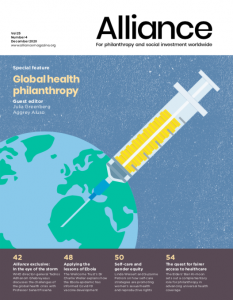Funding global health issues through networked and systems approaches offers greater opportunity for impact during the crisis and beyond.
The ongoing global Covid-19 crisis has put important development advancements of recent decades at risk, and has exposed the shortcomings of social safety nets globally. The outsized devastation witnessed in poor communities globally underscores how the biological systems through which a virus spreads overlap with social systems of poverty and structural racism[1]. The crisis has thus brought new awareness to the fact that social determinants of health – access to clean water and sanitation, health care and food and job security, among other factors – have a direct impact on how communities will weather this pandemic and future shocks. Beyond immediate emergency response efforts, the philanthropic response to the crisis must therefore be both strategic and coordinated, and must address the shortcomings of existing systems in order to building lasting resilience. A growing interest in networked and systems-based approaches among private philanthropy, that has been building over recent years, along with growing awareness among the global business community to the need for more sustainable business practices, provides a path forward for an effective response.
Systems approaches include tackling root causes rather than just symptoms; working at deeper levels of change, such as mindsets, social norms, and power structures; influencing public policies; and paying more attention to both unintended consequences and emergence[2]. This is in contrast to the trend of previous decades of focusing heavily on inputs-activities-outputs of grants and using rigid logic models for planning and evaluation. While this longer-term orientation was already gaining momentum among donors, the Covid-19 pandemic has heightened awareness of how important the underlying structures in which we all live and operate are toward maintaining the status quo.
A leveraged approach through collaboration and partnership with stakeholders including government and multilaterals, for example, has also been gaining some momentum. In Rockefeller Philanthropy Advisor’s experience, many foundations and donors recognise the leveraged impact of collaboration, and some are now better prepared to collaborate, having streamlined internal processes in order to move funding quickly during the initial phases of the Covid-19 emergency. This is important because a networked approach requires planning, an ability to be flexible and responsive to partners, and often, a new mindset about attribution and/or contribution toward an effort. Given the magnitude of the issues the global community is facing, combining systems and networked approaches offers opportunity for positive change.
Systems approaches include tackling root causes rather than just symptoms; working at deeper levels of change, such as mindsets, social norms, and power structures; influencing public policies; and paying more attention to both unintended consequences and emergence.
One such example is the recently-launched African Donor Collective, a group of pan-African philanthropists and business leaders working to catalyse and coordinate multinational, regional, and local philanthropy and business mobilisation in order to help stop the spread of Covid-19 in Africa and to help strengthen public health systems to mitigate the impacts of existing and future diseases on the continent’s most vulnerable. The leveraged impact of local donors working on local issues – strengthening of the ecosystem, ensuring local stakeholder voices are incorporated, creating growth in and for local communities – is an important factor in this work. It will be an important example to follow.
In Brazil, another example by a major corporate donor combines both a grant program and a new business approach, in a signal that one of Brazil’s major private corporations the need to align with experts and to partner with government. A recent donation of $195M on the part of Brazilian Itaú Bank – the largest gift ever in Brazil by a single donor – illustrates the awakening on the part of some global corporations not only to their responsibility to the communities in which they operate, but also to their mutual relationship. That gift was focused on immediate and medium-term health needs, and distribution of funds is left entirely to an independent panel of medical and public health experts, a novel approach for many donors in Brazil and indeed many other countries. Further, as Brazil’s largest lender, Itaú was also the first private institution to participate in a federally backed consortium focused on loans to struggling small- and medium-sized businesses during the pandemic. Itaú launched the Programa Nacional de Apoio às Microempresas e Empresas de Pequeno Porte (Pronampe) – National Program to support micro- and small-businesses[3] in early July 2020 and had 2,800 applications totalling $77 million in just one day through an app created for this purpose. Three billion Reais, or close to $600 million has been committed by the bank. Both programs are new types of partnerships, and show an openness to understanding social issues in a new light.
Philanthropy’s (and the business community’s response) to Covid-19, through new sources of giving, rapid, unrestricted funding, reduced application requirements and increased trust and communication with grantee partners, may forever change the way philanthropy operates. Encouraged by the urgent funding needs and the disproportionate impact of Covid-19 on many communities, funders are beginning to question if they can play a bigger role in making the world more equitable by shifting funding structures to be more effective and inclusive in the long term. In addition, simplified processes mandated by remote work have now opened the door for new approaches. Often accepted bureaucracy and restrictions now seem irrelevant in light of the need to engage in society. With recent World Bank research estimating an additional 71-100 million people may be pushed into extreme poverty in 2020 alone as a result of the pandemic[4], it is time for our community to push through outdated barriers.
This article draws on research from a larger study that RPA produced in partnership with the World Bank, as well as RPA’s own Scaling Solutions toward Shifting Systems initiative.
Donzelina Barroso is Director of Global Philanthropy at Rockefeller Philanthropy Advisors (RPA).
Upcoming issue: Global health philanthropy
Subscribe today to make sure not to miss it!
At £46 billion each year – almost a quarter of all grantmaking – philanthropy spends more on health-related causes than anything else. As the Covid-19 pandemic intensified, philanthropy provided critical funding for vaccine development, medical equipment, mutual aid, social welfare, and global health infrastructure. But there is intense debate about how the largest foundations interact with governments, international bodies and pharmaceutical companies and how they should be held accountable to citizens. This issue of Alliance considers new directions for global health philanthropy and explores whether health funding is going where its most needed. It is guest edited by Julia Greenberg, Director, Governance and Financing, Public Health program, Open Society Foundations and Aggrey Aluso, Manager of Health and Rights Program, Open Society Initiative for Eastern Africa.






Comments (0)